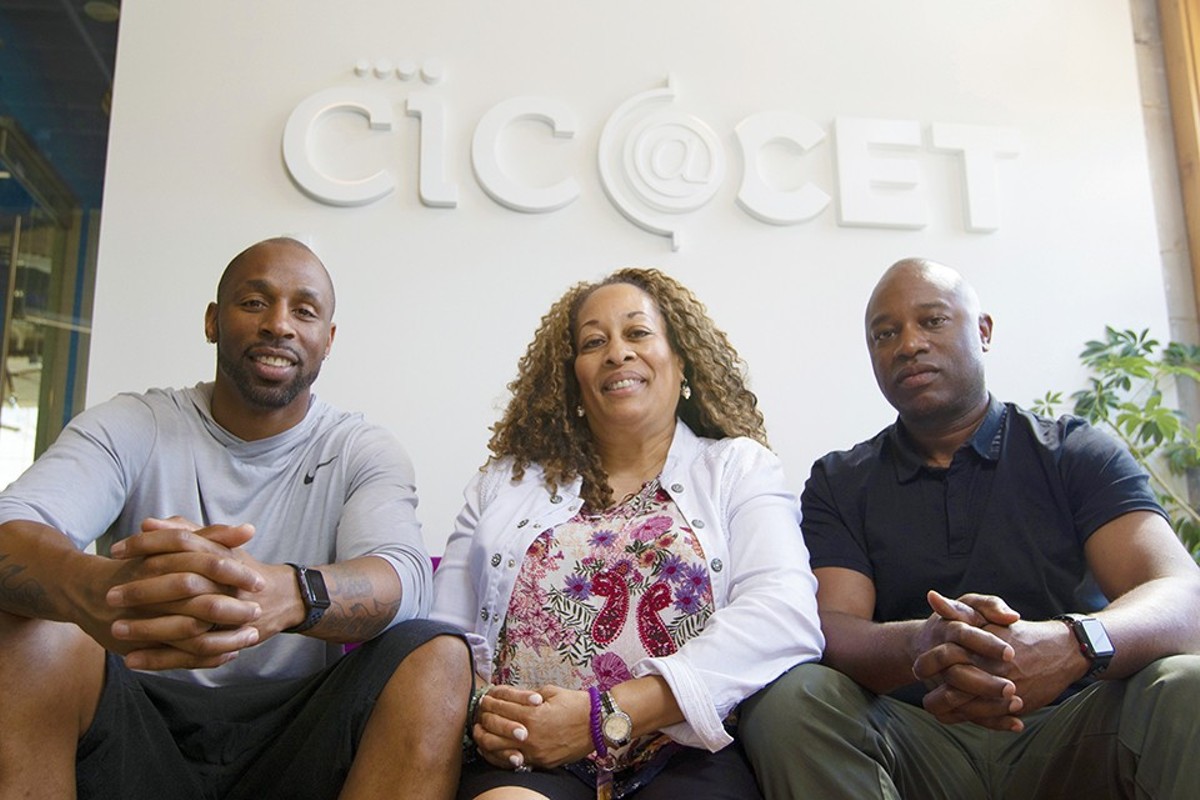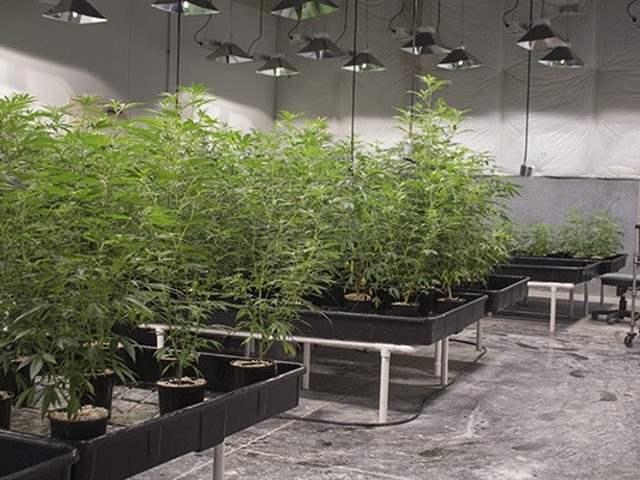For a glimpse of St. Louis' future, pay a visit to the Cortex district, located in a once-quiet neighborhood between Washington and Saint Louis universities.
You will find it in a low, red-brick building at the corner of Sarah Street and Forest Park Avenue. Inside, on the first floor, is an open floor area filled with tables and expensive office chairs, young people huddled in conversation or staring raptly at laptops.
Welcome to the Cambridge Innovation Center co-working space, or, as its founders like to call it, the region's "largest innovation hub."
Here is where aspiring entrepreneurs can find room to work in temporary offices and labs. It's also where ideas and ambitions collide. Where smart people meet, hang out, trade ideas, network. And where maybe — just maybe — they will launch that next billion-dollar business.
And that is what Derek Mays, 48, wants for his fledgling company. But unlike the other entrepreneurs toiling away at CIC, Mays envisions his company's future flourishing not via pixels, algorithms and fiber-optic lines, but through plants. Well, one family of plants, really.
Mays sees the pathway to riches — as well as the creation of much-needed jobs in St. Louis' neglected neighborhoods — following along the buds, nodes and leaves of a family of plants that humans have cultivated, harvested, smoked, cooked with, outlawed at various points and in various places either demonized and exalted, not to mention used in a myriad of therapeutic and enjoyable ways, for at least 10,000 years.
Mays, an intellectual property lawyer and compliance attorney, is founder and CEO of REAL Cannabis Co., which is set to apply for licenses for at least one medical cannabis processing center and several dispensaries, with plans to locate facilities in Midtown St. Louis and north St. Louis County.
Setting up shop in Cortex makes a lot of sense, says Mays, because Missouri's medical cannabis industry is a startup just like its high-tech counterparts.
"With this environment, it just encourages creativity and a thought process that is conducive to our team," Mays says. "We just feed off that energy."
The opportunity to make money on marijuana legally in Missouri finally became a reality last November. That's when more than two-thirds of voters in the state approved Amendment 2, one of the three medical cannabis measures on the ballot and the only one to pass.
August 3 is the earliest that Missouri applicants can submit applications to obtain licenses for the state's voter-authorized 60 grow centers, 86 manufacturing facilities and 192 dispensaries — that's 24 retail outlets for each of the state's eight congressional districts.
The applications cover everything from cultivation to manufacturing, product infusions, testing labs, dispensaries and transportation facilities. Interest is high. As of early June, a total of 526 applicants had paid the fee to start the application process, including 155 seeking to open grow facilities, 82 for manufacturing centers and 289 for dispensaries. Along the way, the state has raked in about $3.8 million in fees, according to the Missouri Department of Health and Senior Services, or DHSS, which oversees the medical cannabis program.
State officials have 150 days from the application deadline to decide who gets a license. That means the first facilities could open as early as January. Meanwhile, Missourians who wish to grow their own medical cannabis — up to six plants apiece — may begin applying for licenses on July 4.
For Missouri cannabis entrepreneurs like Mays, the "green rush" is on for a slice of an industry that is soaring, both globally and nationally, with no end in sight.
In 2018, the value of the legal North American weed industry was about $10.1 billion. By 2025, the U.S. market alone is projected to climb to $24 billion and create 255,000 jobs, according to New Frontier Data, a cannabis market research firm. It could reach $80 billion by 2030, according to a January 2019 report by market analyst Vivien Azer.
Internationally, it will be even bigger, with Canada and Mexico both legalizing its use. Consumer product heavy-hitters Coca-Cola, Altria (the parent company of cigarette giant Philip Morris) and Coors have already started investing heavily in Canadian cannabis companies.
And in Missouri, the economic impact could be significant from the get-go. The Missouri Cannabis Industry Association estimates that Missouri's medical cannabis market could exceed Colorado's, which in 2017 was worth $440 million.
Industry experts such as James Yagielo, CEO of Florida-based HempStaff Inc. projects that Missouri's industry could be serving as many as 200,000 patients by 2021.
"Everybody likes cannabis," Yagielo says.
Mays walks into the foyer of the CIC building late on a Friday afternoon in May. Accompanying him are the other members of REAL Cannabis' partnership team: Dr. Cheryl Watkins-Moore, the chief strategy and marketing officer; and Justin Gage, the chief relationships officer.
Watkins-Moore, a physician and former pharmaceutical company executive, has spent the past decade as a major player in the St. Louis startup scene. She cites the building's "synergistic energies," noting that some companies based there have already engaged them about providing technology to REAL Cannabis.
"This is great that you get those type of collisions and connections," says Watkins-Moore, who serves as director of bioscience and entrepreneurial inclusion at BioSTL, a group that promotes collaboration and builds regional infrastructure to achieve St. Louis' potential in biosciences.
Gage, a stand-out wide receiver for the Mizzou football team in the early 2000s, played for the Chicago Bears and Tennessee Titans. Since leaving the NFL, Gage says he's been interested in doing something with cannabis.
A native of Jefferson City, Gage could have headed to California or Colorado, two states where the medical and recreational cannabis industries are flourishing. "But I didn't want to do that," he says. "So when Missouri legalized, I knew that this was definitely something that I wanted to be a part of and be an advocate for medical marijuana."
Gage notes that he, like other NFL players, had felt pressure to take opiate-based painkillers during his playing days to treat the pain from injuries.
"That was a week-by-week thing," Gage says. "You beat yourself up on one Sunday and you got to figure how you can be 100 percent the following week."
Opiates are highly addictive, and Gage says many of his former teammates struggle with dependency as a result of treatments for football injuries.
Cannabis is different. Gage says it allows him to wake up "and feel good about myself and not worrying about certain aches and pains that I'd have to take heavier medication for," he says. "Just being down that path. Ultimately, it was seeing how destructive a lot of medications could be. I got to stand up for what I believe in. And for me it was marijuana."
But there is another aspect to the REAL Cannabis founders' advocacy. It is the recognition that America's expensive war on drugs was born of racism and xenophobia, a legacy that has sent millions of Americans to prison, shattered countless families and wrecked inner-city neighborhoods.
Harry Anslinger, a notorious racist who in the 1930s was the first commissioner of the Federal Bureau of Narcotics, promoted the idea that cannabis — or as Anslinger dubbed it, "marihuana" — "is a violence-inducing drug, connected it to black and Hispanic people, and created a perfect package of terror to sell to the American media and public," according to Steven W. Bender's "The Colors of Cannabis: Race and Marijuana," a history of cannabis prohibition published in 2016 in the University of California-Davis Law Review.
For Gage, the results of those policies have hit home, with close family members jailed for cannabis possession.
"And you wonder, how can you fix this whole trend?" Gage says. "I knew hands-down that's where I got to go. I got to be in a position to help empower people that look like me and help change the economic status of what we have. That's our goal, one person at a time, one business at a time. I see it as a big step forward in revitalizing [north St. Louis], but ultimately I think this is a big step forward in the right direction."






